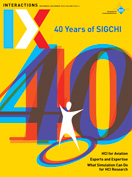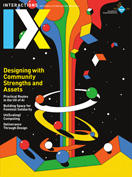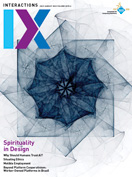Authors:
Anicia Peters
If I had a magic wand, I would want to wave it across my beloved continent, Africa, and make HCI a household term. Before I utter the magic word, let me elaborate on my choice.
I find it difficult these days to articulate this dream that started out so long ago, and that with every passing year seems to fade even more into the distance. I wonder why it still remains so difficult to convince colleagues in universities, industry, and government across the continent that HCI is an essential underlying component of all digital interactions.
There is quite some hype about the African continent and its future in technology. Africa has the youngest population in the world [1]. Combined with the proliferation of mobile phones, this indeed makes for a potential game changer. Africa also has 55 countries that are members of the African Union (AU) [2]. In fact, Africa is divided into five very diverse regional groupings, with stark contrasts in culture as well as different official languages. This makes it extremely difficult to generalize about almost anything across the continent. However, all AU member states strive toward building "the Africa we want" under the AU Agenda 2063, a blueprint and master plan toward the Pan-African vision of "an integrated, prosperous, and peaceful Africa, driven by its own citizens, representing a dynamic force in the international arena" [3]. Information and communication technology (ICT) is one of the major focus areas.
In fact, for many countries on the African continent, the awakening to the Fourth Industrial Revolution [4] is happening only now. It's a buzzword used by everyone, but I wonder whether we truly realize its implications and HCI's tremendous role in how we build the technologies in this revolution.
I have recently started to engage more intra-Africa, as local African expertise in various specialized technological fields and fluency in the AU's working languages are being identified and contracted for projects across Africa. Various universities and centers are also earmarked to offer capacity-building programs and projects. We are fortunate to supply a few of these experts from our university, as most of our faculty hail from African countries. The database identifies African expertise in emerging technologies like AI, big data, IOT, cybersecurity, and even HCI.
As a result of this initiative, I started sitting around tables where dialogues are changing, as we Africans are finally given a seat at the table of donor and development organizations prior to engagement. This also afforded me an opportunity to experience a few lesser-known African countries and cultures. Across Africa, including my own country, Namibia, I met young people who were doing amazing things with technology through free online courses. Sadly, although they use social media platforms such as Instagram to market their products and services, they still experience limitations in accessing cross-border markets. However, I also encountered the attitude from fellow Africans that "well, we are in Africa and therefore cannot expect too much or say anything" or, simply, "well, this is Africa." Although this is very humble, I cannot help but counter that narrative and ask ourselves to expect more for ourselves, our children, and our continent.
Terms such as HCI, interaction design, and user experience still remain unfamiliar to many.
Despite the tech hype and the isolated countries that are really making headway in pushing technology, the majority of the continent still seems sleepy. But though tech startups are virtually nonexistent in my country, digital innovations are slowly increasing. However, the digital innovations developed from just MOOC knowledge often lack design principles or user-centeredness. (Mind you, even the well-thought-out products and services lack this.) Terms such as HCI, interaction design, and user experience still remain unfamiliar to many.
Despite me and my colleagues' aspirations to promote human-computer interaction across the continent to wake the sleeping giant, it has only fluttered its eyelashes briefly each time we tried. In fact, I found that in my own country, HCI has become less known in both industry and academia than earlier in the decade. Our faculty's attempts to introduce HCI degrees were met with the painful realization that the industry is not prepared to absorb such degree holders, and that we would effectively contribute to the already high unemployment rate for graduates. Furthermore, Namibia's prospective employers in industry are mostly branches of South African companies. Unless perceptions change in neighboring South Africa's industry, we have no chance.
Instead of continuing to bang our heads against the wall, we then embarked on a different approach: integrate HCI into everything we do, including all our research projects and our revised curricula. For example, we integrated HCI into our core curricula through courses such as design thinking. I think the best approach to evangelize HCI throughout Africa is to jump on the 4IR bandwagon and integrate HCI with new emerging courses such as AI, Machine Learning and Data Science, and Cybersecurity. So, we are developing the newly hyped programs with HCI integrated.
Putting the wand aside for a moment, I wonder whether massive amounts of money would solve the HCI dilemma. This would certainly facilitate widespread HCI education, research labs, and securing the best talent in the world to help us use HCI as a building block for Africa's digital transformation. However, even if we have the money, will the expertise come to the table and understand our contexts? Will the designers and developers appreciate HCI and incorporate it into their products and services? Will people be willing to be trained? Doubtful me thinks no. How long will it take to change all minds in industry, government, academia, and societies?
So, I pick up the wand, hold it steady, pointed upward, push my glasses higher up on my nose, and then wave the wand and utter the magic word: "Abracadabra! May HCI take root in Africa!"
1. United Nations. World Population Prospects 2019; https://population.un.org/wpp/
2. African Union. Member State Profiles. https://au.int/memberstates
3. African Union. Agenda 2063: The Africa We Want; https://au.int/en/agenda2063/overview
4. Schwab, K. The Fourth Industrial Revolution. Crown Publishing Group, New York, NY, 2017.
Anicia Peters is the dean of the Faculty of Computing and Informatics and an associate professor of computer science at the Namibia University of Science and Technology. She founded the AfriCHI conference series, is one of 10 African Women in Technology Role Models across Africa, and was selected as a UNESCO Research Chair in Gender and Digital Technologies. [email protected]
Copyright held by author
The Digital Library is published by the Association for Computing Machinery. Copyright © 2020 ACM, Inc.








Post Comment
No Comments Found